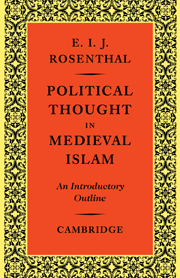Book contents
- Frontmatter
- Contents
- AUTHOR'S NOTE
- ABBREVIATIONS
- INTRODUCTION
- PART I CONSTITUTIONAL LAW AND MUSLIM HISTORY
- PART II THE PLATONIC LEGACY
- V POLITICAL PHILOSOPHY IN ISLAM
- VI AL FĀRĀBĪ: THE FOUNDATION
- VII IBN SĪNĀ: THE SYNTHESIS
- VIII IBN BĀJJA: INDIVIDUALIST DEVIATION
- IX IBN RUSHD: THE CONSUMMATION
- X AL-DAWWĀNĪ: APPLICATION AND INTEGRATION
- APPENDIX: SOME TURKISH VIEWS ON POLITICS
- NOTES
- GLOSSARY
- INDEX
X - AL-DAWWĀNĪ: APPLICATION AND INTEGRATION
Published online by Cambridge University Press: 07 May 2010
- Frontmatter
- Contents
- AUTHOR'S NOTE
- ABBREVIATIONS
- INTRODUCTION
- PART I CONSTITUTIONAL LAW AND MUSLIM HISTORY
- PART II THE PLATONIC LEGACY
- V POLITICAL PHILOSOPHY IN ISLAM
- VI AL FĀRĀBĪ: THE FOUNDATION
- VII IBN SĪNĀ: THE SYNTHESIS
- VIII IBN BĀJJA: INDIVIDUALIST DEVIATION
- IX IBN RUSHD: THE CONSUMMATION
- X AL-DAWWĀNĪ: APPLICATION AND INTEGRATION
- APPENDIX: SOME TURKISH VIEWS ON POLITICS
- NOTES
- GLOSSARY
- INDEX
Summary
TheFalāsifa as a group did not exert much influence on political thought in traditionalist circles. To some extent this was because their political philosophy was only a part of their general philosophy, which aroused hostility and opposition. We have discussed Ibn Khaldūn's criticism of their political thought, but we must bear in mind that his acquaintance with their writings was inadequate and rather superficial and, moreover, influenced by Al-Ghazālī's opposition to falsafa.
On the other hand, the discussion by jurists like Al-Māwardī and Ibn Taymīya of the reasons for the existence of the khilāfa or imāma betrays some influence by them. It is not wholly negative—at least in the case of Ibn Taymīya—and shows at any rate that writers on constitutional theory felt the need to take account of the Falāsifa. The chief obstacle was, no doubt, the theory of prophecy propounded by Al-Fārābī and Ibn Sīnā. Those Falāsifa like Ibn Sīnā and especially Ibn Rushd, who built their political philosophy round the law of the prophetic lawgiver, established an area of agreement which enabled some traditionalist Muslim thinkers like Ibn Taymīya and Al-Dawwānī to incorporate some of their political ideas in their own thought. This seems to bear out my claim that in the realm of political philosophy it is the central position of law which provides the common ground between Plato and Aristotle on the one hand and the Falāsifa, Ibn Taymīya and Al-Dawwānī on the other.
- Type
- Chapter
- Information
- Political Thought in Medieval IslamAn Introductory Outline, pp. 210 - 223Publisher: Cambridge University PressPrint publication year: 1958



